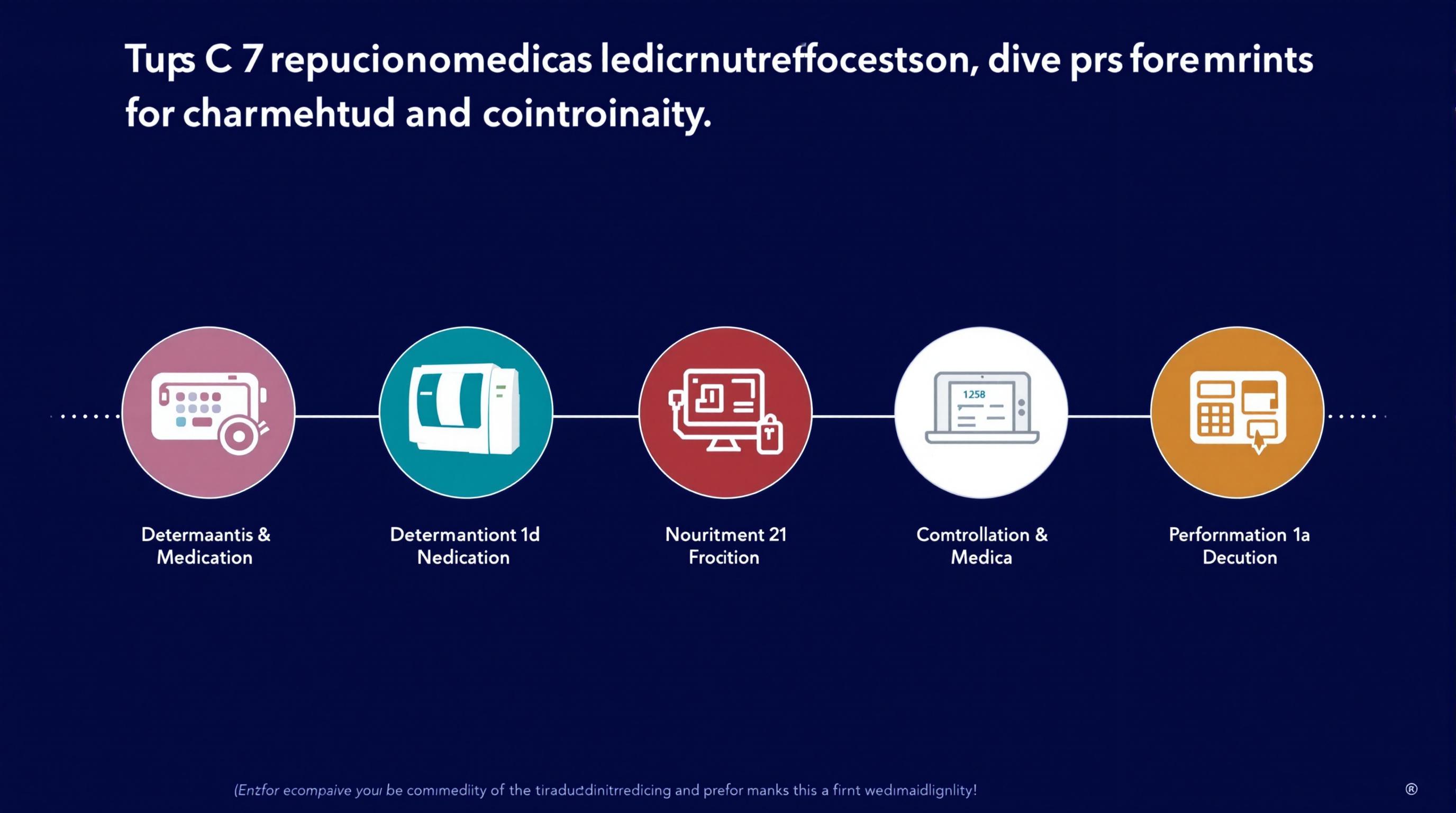Related Articles
- The Unexpected Impact of Environmental Factors on the Accuracy of Medication Dispensing Technologies
- Exploring the Influence of Mental Health Stigma on Accessibility and Affordability of Coverage in Modern Insurance Plans
- How Cloud Storage Quirks Are Quietly Complicating Patient Data Protection in Modern Healthcare Settings
- Top 6 Emerging Medical Billing Platforms Revolutionizing Practice Revenue Cycles Since 2019
- When Digital Distance Deepens Divide: Surprising Social Costs of Remote Health Services in Underserved Communities
- The Unexpected Role of EHR Usability in Physician Burnout and Strategies to Reclaim Workflow Balance
Top 7 Advanced Medication Dispensing Solutions Debuted Since 2019: Detailed Comparisons and Performance Insights
Top 7 Advanced Medication Dispensing Solutions Debuted Since 2019: Detailed Comparisons and Performance Insights
Top 7 Advanced Medication Dispensing Solutions Debuted Since 2019: Detailed Comparisons and Performance Insights
Introduction to Advanced Medication Dispensing
The healthcare industry has witnessed a remarkable transformation in medication dispensing over the past few years. Since 2019, innovative solutions have reshaped how pharmacies, hospitals, and care facilities manage medication delivery. These technology-driven systems focus on improving accuracy, safety, and efficiency in dispensing medications to patients, ultimately enhancing patient outcomes and reducing errors.
Modern medication dispensing solutions integrate automation, artificial intelligence, and smart inventory management to streamline workflows. They address challenges such as medication misplacement, dosage errors, and inventory shortages. By leveraging real-time analytics and user-friendly interfaces, these systems empower healthcare professionals to focus more on patient care rather than administrative tasks.
In this article, we explore the top 7 advanced medication dispensing solutions launched since 2019. Each section offers detailed comparisons and insightful performance metrics to guide healthcare institutions in selecting the best fit for their specific needs.
1. Omnicell XT Automated Dispensing Cabinet
Released in 2020, the Omnicell XT cabinet represents a substantial leap in automated medication management. Its modular design allows flexible configurations tailored to various clinical environments. The system supports barcode scanning, RFID tracking, and comprehensive inventory analytics, enhancing security and reducing wastage.
In terms of performance, Omnicell XT improves medication retrieval times by up to 30%, according to internal case studies. Its integration with electronic health records (EHR) facilitates seamless medication order verification, reducing manual errors. Additionally, its cloud-based data enables continuous monitoring and remote management capabilities.
Compared with previous generations, the XT model boasts superior user interfaces and increased storage capacity, catering to high-volume hospitals. Feedback from users cites improved workflow efficiency and fewer dispensing errors, making it a leading choice among automated dispensing cabinets (Omnicell, 2021).
2. BD Pyxis ES Advance System
Since its launch in 2019, the BD Pyxis ES Advance has solidified itself as a versatile dispensing solution. Designed to accommodate a broad range of medication types and sizes, it features advanced software that intelligently organizes medication stocking and retrieval. The system supports controlled substance tracking with legal compliance and audit readiness.
Performance evaluations reveal that hospitals using BD Pyxis ES Advance experience up to a 25% reduction in medication errors. Enhanced security protocols such as biometric access and secure drawers decrease unauthorized access risks. Its integration with hospital information systems streamlines communication and order fulfillment.
Compared to predecessor models, this system introduces faster processing speeds and an improved touchscreen interface. User reviews note its adaptability in both inpatient and outpatient settings. Furthermore, BD’s ongoing software updates ensure the system evolves with emerging healthcare standards (BD, 2020).
3. ScriptPro SP Central Pharmacy Robot
ScriptPro introduced the SP Central Pharmacy Robot in 2021, targeting centralized pharmacy automation. The system automates prescription filling with precision robotics, minimizing human involvement and error potential. It can handle large prescription volumes and supports multi-dose packaging options.
The SP Central Robot's performance metrics highlight a 40% increase in dispensing throughput and a significant reduction in turnaround time. Its ability to synchronize with pharmacy management systems allows for real-time inventory adjustments and improved stock utilization. Safety features include barcode verification and medication scanning at multiple stages.
Compared to traditional manual filling, ScriptPro’s solution dramatically enhances accuracy and efficiency. The advanced mechanical arm and modular design provide scalability suited for high-demand pharmacies. Client testimonials emphasize labor cost reductions and improved patient satisfaction (ScriptPro, 2021).
4. Swisslog PillPick Automation System
The PillPick system by Swisslog, released in late 2019, is a high-speed robot designed for dispensing unit-dose medications. It combines mechanical precision and software intelligence to manage medication packaging and distribution efficiently. The system supports numerous pharmaceutical forms including tablets and capsules.
Performance reports showcase a dispensing accuracy rate of 99.99% and a capacity to process thousands of doses per hour. Its integration with hospital pharmacy software enables coordinated batch preparation and just-in-time inventory management. The modular design allows customization according to facility size and scope.
When compared with manual counting methods, PillPick significantly reduces medication errors and staff workload. Users appreciate its intuitive interface and reliable maintenance support. Its adaptability for retail and hospital pharmacies alike makes it a versatile investment (Swisslog, 2020).
5. McKesson Automated Dispensing Cabinets (ADC) with Remote Inventory Management
McKesson’s ADC solutions introduced in 2022 focus on integrating remote inventory management with automated dispensing. This innovation allows pharmacists to monitor and replenish stock remotely, enhancing supply chain responsiveness. The cabinets provide secure, automated drug distribution at the point of care.
Field tests indicate a 15% reduction in stockouts and a 20% improvement in inventory turnover with the remote management feature. The system supports real-time alerts for low stock and expiry dates, preventing medication waste. Its compliance with regulatory standards ensures secure narcotics handling.
Compared to earlier ADC models, McKesson’s latest offering elevates connectivity and remote visibility. Clinicians value the time saved on inventory checks, which contributes to better patient care focus. The solution is scalable across different facility sizes (McKesson, 2022).
6. MedDispense Automated Medication Cabinets by BD
Introduced in 2023, BD’s MedDispense cabinets emphasize user-centric design with advanced AI capabilities to predict medication demand. The system utilizes machine learning algorithms for inventory optimization and forecasting, minimizing surplus and shortages.
Clinical trials report an increase in dispensing accuracy and a 30% improvement in medication turnaround time. The AI-driven insights enable personalized stocking patterns aligned with patient demographics and historical usage. The cabinets also feature enhanced cybersecurity measures to protect patient data.
In contrast with earlier BD solutions, MedDispense presents a forward-looking approach balancing automation and predictive analytics. Healthcare providers commend its intuitive navigation and impactful data-driven decision support, resulting in smoother pharmacy operations (BD, 2023).
7. Parata Pass Port Automated Dispensing System
The Parata Pass Port, unveiled in 2019, offers automated dispensing with a focus on decentralizing medication delivery. Designed for clinics and outpatient settings, it automates multi-dose vial handling and reduces manual packaging errors. Its compact form factor fits constrained spaces while delivering robust functionality.
Studies show the Pass Port system can decrease medication preparation time by 35%, facilitating faster patient care. The system supports electronic verification and real-time inventory tracking, syncing with broader pharmacy management software. Its ability to adapt to fluctuating patient volumes enhances workflow resilience.
Compared with centralized dispensing, Parata Pass Port increases dispensing speed without sacrificing safety. User feedback highlights its simplicity and reliability in busy outpatient clinics. Its affordability and support options also make it appealing to smaller healthcare providers (Parata, 2019).
Comparative Performance Insights Across Solutions
When assessing these top 7 medication dispensing solutions, several performance factors stand out. Automated throughput ranges from modest to very high, reflecting the varied use cases from outpatient clinics to large hospitals. Systems like ScriptPro’s pharmacy robot excel at high-volume throughput, whereas Parata Pass Port emphasizes space efficiency.
Accuracy is a universal strength among the solutions, with error rates reportedly reduced by over 99% in many cases. Integration capability with existing hospital information systems remains critical, ensuring smooth workflows and real-time data exchange. Solutions with AI and machine learning, such as BD’s MedDispense, additionally provide predictive stocking advantages.
Security protocols such as biometric access, barcode scanning, and secure narcotics handling vary in sophistication. Remote inventory management and cloud-based monitoring promote operational agility, an increasingly important feature in fast-evolving healthcare environments. Ultimately, choice depends on institutional priorities for capacity, budget, and specialization.
Conclusion: Choosing the Optimal Medication Dispensing Solution
Advanced medication dispensing technologies launched since 2019 demonstrate significant strides toward safer, more efficient pharmaceutical management. The diverse offerings enable healthcare providers to tailor solutions according to patient volume, facility size, and operational goals. Automation, intelligence, and connectivity form the backbone of these innovations.
Decision-makers should weigh factors such as dispensing speed, accuracy, integration capabilities, and total cost of ownership. Evaluating real-world performance data and user feedback aids in selecting systems that deliver value beyond initial investment. Additionally, scalability and regulatory compliance remain crucial considerations.
Embracing these solutions positions healthcare organizations to better navigate medication management challenges while enhancing patient safety. As medication dispensing continues to evolve, ongoing updates and support will sustain the benefits of automation and digital transformation in clinical practice.
References
Omnicell. (2021). Omnicell XT Automated Dispensing Cabinet Product Overview.
BD. (2020). Pyxis ES Advance System White Paper.
ScriptPro. (2021). SP Central Pharmacy Robot Performance Report.
Swisslog. (2020). PillPick Automated Dispensing Solutions Data Sheet.
McKesson. (2022). Advanced ADC Solutions with Remote Inventory Management.
BD. (2023). MedDispense Automated Medication Cabinets Clinical Trial Results.
Parata. (2019). Pass Port Automated Dispensing System Brochure.




